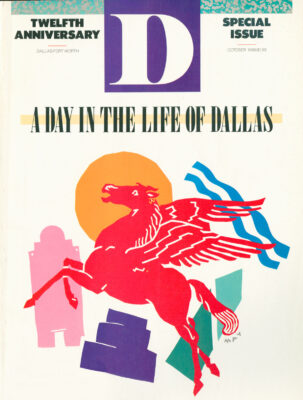Well, maybe that subhead is a bit overheated, but I wanted to get your attention because 1 need your help. For the past year I’ve been collecting news clips, ads, brochures, and other evidence to document a very distressing trend. Periodically, I’ve even taken samples of the cultural ambience to a laboratory and had them checked. The litmus paper did crazy things, so I know something strange is happening. I just don’t know what it is. Let me give you some examples of the sort of thing we’re up against. Then I’ll tell you how you can help-if you dare.
ITEM: “With cynical hype, five British rockers ride Sigue Sigue Sputnik to semi-stardom.” From People magazine, that’s a journalese headline to a story on a rock group (pronounced “zig zig”) that is “an over-hyped clique of no-talents who care more about the color of their lip gloss than their music.” And the members of the group, who wear fright wigs and fishnet face masks that make Kiss look positively cuddly, would happily admit that they’re lousy musicians who aren’t likely to get much better. Why should they? They’ve already had a hit record in England. The band started out to become a media event, just to see how far they could get on promotion gimmicks and bombast. They were confident that good PR and self-puffery are surer roads to stardom than genuine talent and achievement; so far, the public has been eager to prove them right. If you’re not yet appalled, try this: the group’s first album features, between songs, advertisements for hair-care products and electronic gadgets. If you’re out to milk cash from a gullible public, why not go all the way? “We’re trying to sell exploitation,” says one member of the “band.”
ITEM: Vanna White is the woman who turns the letters on “Wheel of Fortune,” a TV game show. She seldom says more than a few words on the show. For this arduous work, she makes more than $100,000 a year. As a further gift to the world of letters, she is writing a book about her life.
ITEM: Timothy Leary spent the Sixties telling young people to “turn on, tune in, and drop out” of our rotten, materialistic society. Truth and salvation lay in psychedelic drugs and Eastern mysticism. This past summer, Leary was in town to demonstrate his new software program, Mind Mirror, designed for the IBM, Apple II, and Commodore 64 computers. A newspaper ad touted Leary’s creation as “personality software [this is a quote] that’s part game, part tool, and part philosopher.”
Okay. What are we looking at here? What is the common denominator of all these tidbits, and why should it matter? Is it just me, or does anyone else feel in his guts that something is wrong here on a pretty large scale? While you think about it, here are some more cultural curiosities from the file I’ve labeled “The Amorphous Problem.”
ITEM: To publicize his war on drugs. President Reagan and other top officials took urine tests. All passed with urine tainted by nothing more than caffeine and Tagamet. A waiting nation breathed a sigh of relief.
ITEM: The New Republic, a serious magazine of politics and the arts, recently argued that the best way to pressure South Africa into ending apartheid was to use what it called “The Cosby Sanction.” Want to get tough with the Afrikaners? Then stop sending them American television shows like “The Cosby Show” (South Africa’s most popular program), “Dynasty,” “Dallas,” and ’The A-Team.” That’ll hit those pariahs where it hurts.
I could go on and on, because what we’re talking about here, whatever it’s called, has me almost hype-notized. And no answer or description I’ve seen quite explains it. In vain I’ve pored over books like Intimate Strangers: The Culture of Celebrity by Richard Schickel and PR: How the Public Relations Industry Writes the News by Jeff and Marie Blyskal. Both books offer tantalizing hints, both fumble at the knot, but neither quite unties it. So like Omar, I came out by the same door wherein I went.
Schickel thinks we’ve become a society hooked on celebrities who seem to lead lives more “coherent” and interesting than our own. It’s hard to summarize his thoughtful book, but in part, he fears that some of us have become more concerned with the doings of Joan and Boy George and Fergie and Clint than with our own lives. And that has unhealthy consequences in many areas of life, including politics. With our attention spans shortened by television, and the print media too eager to oversimplify, we are in danger of losing the ability to follow a complex argument, analyze a tough issue, and make a responsible decision. We respond not to ideas and debate, but to bumper-sticker slogans and especially to the image, the quick take. Thus Jimmy Carter had his energy-saving sweaters and Reagan had his urine test. Did anyone really think the chief executive had been snorting cocaine? It was an act of pure symbolism, great for the 6 p.m. news, but the action, uh, clouded an issue fraught with questions about civil liberties, (And the PR nonsense is spreading. In September a Georgia congressional candidate presented his clean urine as proof that he was more fit for office than his opponent, who had not been tested.)
Intimate Strangers is most alarming when Schickel ponders the effect of a celebrity culture on the unstable, especially on certain varieties of the criminal mind, such as the assassin and the terrorist. Schickel’s analysis of John Hinckley, for example, pretty well matches Hinckley’s analysis of himself. Given the world he lived in, the gunman’s actions had a perverse logic running something like this: Jodie is famous. She will love me if I am famous. If I shoot the president, / will be famous. According to Schickel, Hinckley is merely the most clear-cut exam- ple of a genre of criminals who know that celebrity can be won “in open audition, with deadly directness.”
Schickel has another observation about the culture of celebrity that I find intriguing. “It is difficult to write critically, or for that matter to think critically, about an environment. It simply is. And all you can do is decide whether to exist in it or not.”
Maybe that explains why it’s so hard to get a handle on this problem. We live in an environment saturated with celebrities, people who are “well known for being well known,” and often we cannot remember anything they ever did that was superior or entertaining or even mildly interesting. And yet. there they are. Is there any American past the age often who has not seen Zsa Zsa Gabor yapping and preening on a talk show? Johnny Carson and David Letterman will often make fun of some vapid guest whose vocabulary seems to consist of “wow” and five other words- but they are there on national television, hobnobbing with other celebs and hauling down fortunes.
Like gravity, the celebrity culture is always there. How can the fish describe the water that has always surrounded him? So, when we meet the reductio ad absurdum of celebrity-Sigue Sigue Sputnik, Vanna White-we’re not as shocked as we should be. We’ve lost some of our capacity for outrage. (No, this column will not end with a plea for you to stick your head out the window and yell. “I’m mad as hell and I’m not going to take it anymore.”)
In the old days back before the mini-series, we used to think there was a right order of things that went something like this. A person started out unknown. He or she worked hard to develop a skill, build a better mousetrap, do or say something new, or something old in a better way. Then, perhaps, came money and fame. And in the rarest cases, a few of these people became larger-than-life household faces, almost as familiar to us as our friends and relatives.
How quaint and old-fashioned that seems now. These new celebrities, the Willard Scotts and Vanna Whites and their ilk, simply skip the hard part-the talent and genuine achievement-and go right to the riches and fame. Maybe they’re the perfect egalitarian symbols, along with the Barry Mani-lows and Clint Eastwoods. Most of us don’t have incredible talent, so what right do we have to demand talent of our heroes?
Perhaps we should stop wasting our time on questions so hard to answer and just jot down our diet tips and our answers to Twenty Questions People Usually Ask. You never know when the National Enquirer might call.
But if that seems unsatisfactory to you,and if you have the vague sense that something has gone wrong (even if you don’t thinkthe consequences are as dire as Mr. Schickelpredicts), then let me hear from you. I’m notasking for solutions: the thing may havegrown beyond solutions already. Maybe it’snot even a problem. I’d just like to hear yourthoughts on the questions we’ve raised here.If we get some good responses, I’ll sharethem in a future column. Send any thoughtson the matter to The Amorphous Problem,D Magazine, 3988 N. Central, Suite 1200,Dallas TX 75204.
Related Articles

Home & Garden
The One Thing Bryan Yates Would Save in a Fire
We asked Bryan Yates of Yates Desygn: Aside from people and pictures, what’s the one thing you’d save in a fire?
By Jessica Otte

Business
New York Data Center Developer Edged Energy to Open Latest Facility in Irving
Plus: o9 Solutions expands collaboration with Microsoft and Dallas-based Korean fried chicken chain Bonchon to open 20 new locations.
By Celie Price

Restaurants & Bars
Where to Find the Best Italian Food in Dallas
From the Tuscan countryside to New York-inspired red sauce joints, we recommend the best of every variety of Italian food available in North Texas.


